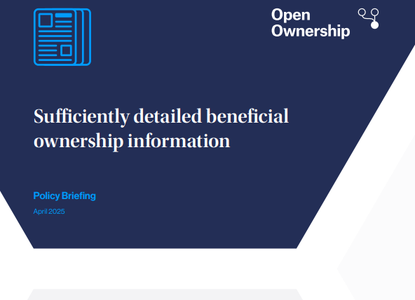Updated January 2023
Beneficial ownership declarations should collect sufficient detail to allow users to understand and use the data
- Information should be collected about:
- the beneficial owner(s);
- their status as beneficial owner(s) (i.e. the means through which ownership or control is held); and
- the declaring corporate vehicle and individual submitting the declaration.
- Information should be collected in a standardised way through online forms, with clear guidance that facilitates compliance.
- Sufficient information should be collected to be able to unambiguously identify people, entities, and arrangements, using clear identifiers, and to enable the accuracy of the data to be verified to a reasonable level.
- Information required to be disclosed should be enumerated in law and limited to what is necessary to achieve the policy objective, with a clearly stated purpose and legal basis.
- Where beneficial ownership is held indirectly through multiple entities or arrangements, or ownership or control are exerted formally or informally through another natural person, sufficient information should be collected to understand full ownership chains.
- Where beneficial ownership can be expressed as a percentage, for example, when held through shares, absolute values should be collected.
- Information about any state ownership or control (domestic or foreign) and individuals holding positions of control specific to state-owned enterprises (e.g. senior managing officials) should be collected.
Collecting sufficient fields of data about the beneficial owner and the declaring entity or arrangement enables users to interpret the data and determine which individuals and corporate vehicles the declaration refers to, and to reasonably verify the accuracy of the information. It may be necessary to collect different information about different groups of individuals in order to achieve this (e.g. domestic versus foreign beneficial owners).
Using clear identifiers helps disambiguate between and match different people, entities and arrangements. This is important, for instance, when entities emulate the names of respectable companies. In line with the principle of data minimisation, jurisdictions should limit collection to what is necessary to achieve their policy aims and ensure that this conforms to privacy and data protection legislation.
Rather than ranges, collecting absolute values when disclosing the percentage of ownership or control will assist users in understanding how ownership or control is held, and enable verification. This is particularly important when ownership or control is held indirectly, and should be done by collecting data through online forms with clear guidance. Where ownership or control is held indirectly through other entities or arrangements, full visibility of ownership chains is important for understanding and verifying how ownership and control are exercised. Governments should explicitly require the disclosure of stakes held by states, directly or indirectly, and distinguish state ownership from private ownership by collecting information in a consistent and defined format.







